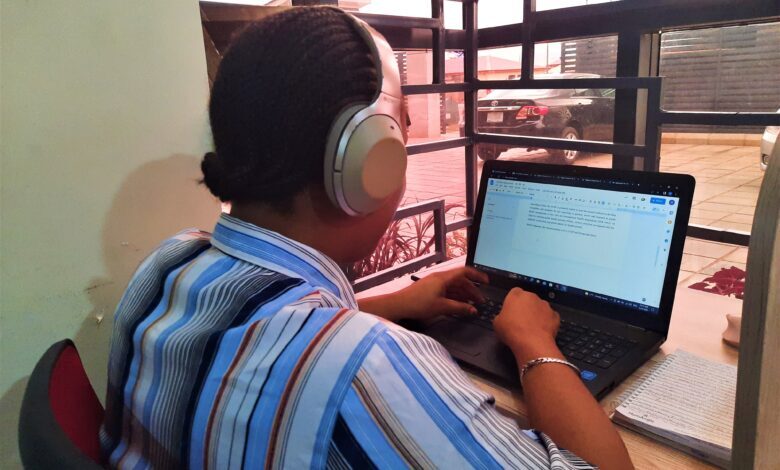Journalism Under Threat As 9 West African Media Houses Suffer Attacks In 5 Months
Aside from the destruction of several media equipment in the affected newsrooms, 13 journalists were also assaulted between Jan. and May 2022.

At least nine media houses have suffered massive attacks in four West African countries, including Nigeria, in the first five months of 2022.
Besides the destruction of several media equipment in the affected newsrooms, at least 13 journalists were also assaulted between Jan. and May this year. Ghana, Guinea Bissau, and Liberia are other countries where the attacks occurred.
The first incident was recorded on Jan. 3 when an armed gang invaded the office of Thunder Blowers Online, an online newspaper and TV station in Gusau, the state capital of Zamfara, Northwest Nigeria.
The attackers assaulted Mansur Rabiu, an editor of the newspaper, after they asked about Abdul Balarabe, the newspaper’s Hausa-language editor.
“They said they were sent to teach a lesson to one of our staff, Abdul Balarabe. But he was not around when they came, so they decided to descend on the staff present,” Zaharadeen Zarumi said in a statement signed on behalf of the newspaper’s management.
“A Multimedia editor, Mansur Rabiu, was wounded and had his phone taken away while another staff member, Sulaiman Dan Aljanna, had his personal computer taken away too.”
The newspaper said a member of the gang later called to reveal that the attack was in retaliation to the critical reports by the online newspaper about the Zamfara State Government.
On Jan. 10, National Intelligence Agency (NIA) officers invaded the Peoples Gazette’s head office in Federal Capital Territory Abuja, North-central Nigeria.
They threatened the security men at the gate and forced their way into the news outlet’s offices to demand the sources of a confidential memo, which was the basis of a report published by the online newspaper.
Three days later, an armed gang attacked Radio Ada (93.3 FM) in the Greater Accra Region of Ghana on Jan. 13 over a critical report on a mining deal. The attackers reportedly broke the door to the studio, ordered the presenter, Gabriel Korley Adjaotor, to stop broadcasting, and proceeded to disconnect cables, smash computers and destroy the console and microphones.
“The attackers, one of whom carried a pistol, hit and kicked our staff all over his body for more than ten minutes, shoved receptionist Ruby Ate and held her in her chair, and forced me to kneel while they ransacked the office,” Gideon Amanor Dzeagu, producer and anchor of the programme disrupted told Committee to Protect Journalists (CPJ).
At about 10 a.m. on Feb. 7, military men attacked Radio Capital FM based in Guinea Bissau and severely injured seven journalists working with the station for hosting an unflattering discussion of an abortive military coup.
One of the victims, Maimuna Bari, was taken to Portugal for treatment having suffered severe injuries from a steep fall. Unfortunately, the media has yet to resume broadcasting since then.
In Liberia, an armed gang attacked Radio Tamba-tiakor in Foya on Mar. 5, setting fire to a motorbike which the station used for its despatch services and errands.
The management said the attack came after it had received reports that the traditional authorities in the community were upset with the station’s crusade against female circumcision, a common cultural practice in the area.
In Nigeria, suspected armed robbers invaded the premises of a private radio station, Fresh 105.9 FM, located at Ibadan, Oyo State in the Southwest region, on April 10.
They disrupted the station’s broadcast for some minutes and took away equipment belonging to the station, including recorders, smartphones, and laptops.
On May 16, hoodlums stormed Benya FM at Elmina in the Central Region of Ghana. They assaulted a programme host and producer before destroying the station’s equipment.
The thugs were believed to be political party militants who accused the station of exaggerating problems associated with distributing the government’s subsidised premix fuel meant for fisherfolk in the area. They destroyed computers, mixers and microphones.
HumAngle reported that on May 30, suspected separatist militants in Anambra State, Southeast Nigeria, burnt two vehicles on the premises of Anambra Broadcasting Station (ABS) in Idemili North Local Government Area of the state.
In reaction to the attacks, the Media Foundation for West Africa expressed solidarity and called on all stakeholders to lend a hand in pushing back against the marauding thugs and arsonists bent on attacking critical journalists and media organisations into silence.
“It is a legitimate discharge of the media’s public education functions and fulfilment of the public’s right to information about critical issues of local or national concern. This is the essence of the media’s role as a platform for engagement and an enabler of the right to information.
“The media organisations involved and the entire media fraternity in the affected countries must continue to follow up on the cases with the police, demand updates, and run count-down and anniversary campaigns to keep perpetual pressure on the authorities to find the perpetrators,” the foundation advised in a statement on its website.
Support Our Journalism
There are millions of ordinary people affected by conflict in Africa whose stories are missing in the mainstream media. HumAngle is determined to tell those challenging and under-reported stories, hoping that the people impacted by these conflicts will find the safety and security they deserve.
To ensure that we continue to provide public service coverage, we have a small favour to ask you. We want you to be part of our journalistic endeavour by contributing a token to us.
Your donation will further promote a robust, free, and independent media.
Donate HereStay Closer To The Stories That Matter




